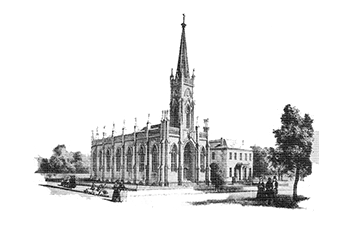The Essex steamed downstream on the 26th, and came to anchor off Port Hudson to reconnoiter reported batteries in progress. No effectual reconnaissance could be made, as the small number of men left on board for duty prevented hazarding a force on shore for such a purpose. A company of soldiers to act in that capacity would have proved invaluable. Earth-works were seen which brought on them the fire of the Essex and their consequent destruction. Unfortunately, in cannonading these earth-works the 10-inch pivot gun of the Essex burst. She remained off this port keeping up a desultory fire on the position supposed to have masked batteries, and shelling the woods, until the 28th, when she again returned to Bayou Sara for the small amount of coal left at that place.
At dawn on the morning of the19th an armed boat’s crew was sent to bring off this fuel, when it was again attacked by the guerillas from the Market-house and buildings remaining. The officer in charge returned the attack, drove the enemy out of the Market-house, which he burnt, as well as what buildings were left of the town. The fuel left uninjured was brought on board, and leaving the site of this treacherous town, the Essex weighed anchor and steamed upstream for the mouth of the Red River.
Porter intended going up this tributary of the Mississippi, but was unable to do so, the low stage of water at its mouth preventing the Essex from passing the bar. A boat was sent up, however, a short distance, and information confirmed that large supplies of cattle, salt, cotton, etc., were being constantly brought down for the enemy east of the Mississippi River. Intelligence was also obtained that two transports laden with these commodities, and convoyed by a Confederate gun-boat, had the previous day steamed up for Natchez.
Losing no time, the Essex started in pursuit, and arriving off the city of Natchez anchored on the 1st September. The enemy had anticipated her untiring antagonist, however, for transports and gun-boat had cleared out—without doubt seeking protection under the guns at Vicksburg. Fuel was all but exhausted, but fortunately there was found a good supply at Vidalia, a town situated on the west bank of the Mississippi, immediately opposite Natchez. The Mayor was apprised that, as being contraband of war, the coal would be confiscated for the use of United States vessels. Exception was taken to this confiscation on the ground that it was the property of private individuals; but this could not be proved, and hence not allowed. It was absolutely necessary to have fuel, and sufficient for the wants of the Essex was at once taken possession of.
Having completed coaling by 2p.m. on the 2nd September, prior to leaving Porter sent ashore to procure ice for his sick and wounded men, which were many; and also a letter to be delivered to the Mayor. Up to this time courtesy had existed between the citizens of Natchez and the Federals of the gun-boat. The men sent from the Essex having obtained the ice required, and on the point of returning to their boat, which lay alongside the wharf, were suddenly attacked by over two hundred citizens armed with muskets. One seaman was instantly killed; and the officer in charge, with five seamen, wounded. No provocation had been given, nor had anything occurred to lead to the supposition of intended attack. The outrage was wanton. The wounded crew hastened to their boat, while the Essex opened her guns without delay on the treacherous city, and continued the bombardment for an hour and twenty minutes—a severe retribution, though richly deserved. Throughout this bombardment a heavy musketry fire was kept up by the enemy, which literally swept the decks of the Essex.
Some have condemned the bombardment of this city, on the ground that time was not allowed for the helpless to leave the place; but the responsibility rests with the attacking party. Porter could not see his men murdered and have preventive power in his hands. The attack was evidently premeditated, as was proved by the number of armed men who kept constant fire on his vessel. The Mayor, by raising a flag of truce, could have stopped the fire of the Essex at any moment. If, there, the weaker inhabitants suffered by the bombardment, the odium and cruelty rests on the authorities; and punishment for injuries done should be visited on those whose murderously attacked the boat’s crew of Essex.
During the bombardment of Natchez another misfortune befell the armament of the Essex by the explosion of one of her 9-inch forward guns.
Porter was anxious to push on up the river; so, leaving the arrangement of peace or more extended punishment for Natchez to a future visit, he steamed toward Vicksburg to find, if possible, the supply transports and gun-boat which were supposed to have taken refuge there. The Essex arrived about five miles below that city on the morning of the 5th, and discovered the Confederate vessels lying snugly under the batteries and alongside the wharf. Steaming on toward our old fighting-ground, it was soon found that, since leaving on the 24th July, great additions had been made to that strong-hold. At that part of the river, where, in July, Farragut’s fleet had rested quietly at anchor, two batteries abreast and one to her rear opened on the Essex. The ridge that extends from the southern extremity of Vicksburg, parallel to and distant from the Mississippi about 1000 yards, may be called one continual battery, which will sweep the whole of the river and any ships advancing from the south for over give miles. Though not seen by Porter, yet information received led him to believe the upper or northern defenses were strengthened in equal ratio by our indefatigable enemy.
Source: The Gunboat Essex, by C. E. Lester, Harper’s New Monthly Magazine, No. CLIIL, February 1863, Vol. XXVI


